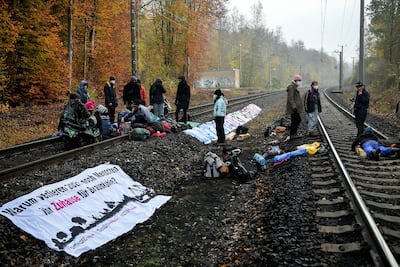Few people have a longer history of attending UN climate change conferences than German Chancellor Angela Merkel, who was president of Cop1 in Berlin when she was environment minister in 1995.
But she will soon hand over power to a government that will be under pressure to take more radical action to cut Germany’s carbon emissions.
Activists say Germany, as Europe’s richest country and one of history’s biggest emitters, should be doing more than Mrs Merkel has done to tackle the climate crisis.
The new government will take on the presidency of the G7 in 2022 and be expected to build on what is achieved at the Cop26 summit in Glasgow.
“Germany not only has a huge opportunity here to lead the way but also a huge responsibility, especially a historical debt it needs to pay,” climate activist Greta Thunberg said on a podcast with her German colleague Luisa Neubauer.
“If Germany would suddenly change and start treating the climate crisis like the crisis it is, that could change everything, the whole global narrative.”
An opinion poll carried out during the Glasgow summit showed 67 per cent of Germans believing their politicians should do more to tackle climate change.
This included not only 97 per cent of Green party voters, but most supporters of all other major parties, except the far-right Alternative for Germany.

Germany has sought to expand its climate ambition since its constitutional court criticised its existing policies for shifting the burden on to young people.
During the Cop26 talks, Germany was one of 46 countries which promised on Thursday to steer away from coal power by the 2030s.
The three parties that hope to form a coalition by next month have set a goal of achieving this by 2030 if possible, faster than Mrs Merkel’s 2038 date.
Lisa Goeldner, an activist with environmental campaign group Greenpeace in Germany, raised concern about an open-pit coal mine that energy giant RWE hopes to expand.
Critics say expanding the mine in Luetzerath, western Germany, contradicts Berlin's promises to meet the Paris Agreement goals of limiting global warming to no more than 1.5°C above pre-industrial levels.
“While speeches are given in Glasgow, the RWE coal excavators are getting ever closer to Luetzerath,” Ms Goeldner said.
“The incoming coalition must finally set 2030 in stone as the date for the coal exit, and guarantee that all villages are protected.”
The coalition talks between the Social Democrats (SPD), Greens and Free Democrats (FDP) come after an initial agreement to invest in renewable energy.
However, the pro-business FDP secured pledges not to increase taxes to pay for investments and to rule out a speed limit on German motorways.
Speaking in Glasgow, Maria Flachsbarth, a junior economy minister in the outgoing government, said she expected the new coalition to make climate change a priority.
“I’m very certain that Germany’s upcoming G7 presidency will be putting climate action at the top of the agenda next year,” she said.
“The new government, they will be able to build on the outcomes of the British G7 presidency this year and of these climate negotiations in Glasgow.”



